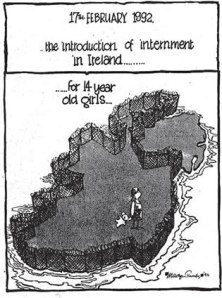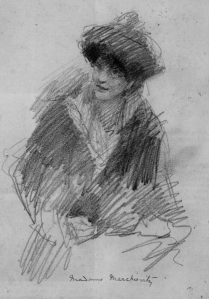 As so often, Malcolm felt that previous post was incomplete and inadequate.
As so often, Malcolm felt that previous post was incomplete and inadequate.
He therefore found himself flicking through Diarmaid Ferriter’s The Transformation of Ireland.
Chapter Five of Ferriter’s tome deals with the period from de Valera’s accession to power in 1932 until the end of the war-time Emergency. It includes (as each chapter-period does) a consummate account of the social developments. So here we find a useful section on the position of women in Ireland. This is particular salient in the light of article 41.2 of de Valera’s constitution of 1937:
In particular, the State recognises that by her life within the home, woman gives to the State a support without which the common good cannot be achieved.
The State shall, therefore, endeavour to ensure that mothers shall not be obliged by economic necessity to engage in labour to the neglect of their duties in the home.
Ferriter then considers Ireland’s Criminal Law Amendment Act of 1935, the crucial legal ban on the sale and import of contraceptives:
the culmination of four years of debate following the Carrigan Report on sexual offences, which was never made public on the grounds that its sweeping statements relating to immorality in Irish life were too embarrassing, if not exaggerated. Statutes passed for England and Scotland in 1922 and 1928 and for Northern Ireland in 1923 meant the law concerning sexual offences against minors was more lenient in the 26 counties than the United Kingdom.
The absolute ban on contraceptives was enforced in the explicit awareness that it could lead to an increase in abortion and infanticide.
Ferriter adduces there is actual evidence to show the extent to which this occurred. In the years of the war-time Emergency (1940 – 1946), when travel out of Ireland was restricted, at least 46 cases of infanticide came before the Courts. Between 1925 and 1940 there had been fewer than twenty.
As with unemployment, Ireland’s problem was being exported.
Reproductive rights came to the fore in the 1970s.
First there was a 1974 Irish case, McGee v. The Attorney General, which established there were rights of marital privacy. Since, in the US, the right of privacy, established in 1965 by Griswold v. Connecticut, was a building-block for Roe v. Wade in 1973, alarm bells began ringing among the batty belfries of the Catholic conservatives. Then, in a curious twist, in 1978 Fiona Poole was a candidate for President of the Irish National Teachers’ Organisation (INTO). She was known as a feminist, separated from her husband, and a supporter of family planning. She was elected, with considerable, and unusual, support coming from north of the Border. In effect, the Catholic and reactionary element in INTO and the northern progressives fed off each others’ prejudices.
Constitutional tinkering
All this led to a foetid Pro-Life campaign to amend the Irish Constitution, to ensure a perpetual ban on abortion:
The State acknowledges the right to life of the unborn and, with due regard to the equal right to life of the mother, guarantees in its laws to respect, and, as far as practicable, by its laws to defend and vindicate that right.
In 1983, this passed on a two-thirds majority. Informed consensus was the amendment was unnecessary, because it simply restated the existing law, the Offences Against the Person Act, 1861.
Secret histories
In February 1984 15-year-old Anne Lovett was found dying, in childbirth, in a grotto behind St Mary’s Catholic Church, Granard, in the County Longford.
Ferriter records how this caused Gay Byrne, for RTÉ , to be deluged with letters narrating gruesome and painful personal experiences. Fintan O’Toole, in A Mass for Jesse James: a Journey Through 1980’s Ireland, saw this as the moment when “hidden Ireland” came into the open, and Irish society became able to explore its darker corners:
a sort of secret history of modern Ireland emerged that day with stories of every decade since the 1940s, stories that had been told to no one, stories that had been bottled up and swallowed down.
Infanticide, again.
In April 1983 a murdered child was found, stabbed, on the foreshore at Cahirciveen. The Gardaí extracted a confession, which was later withdrawn: this led to the discovery of a second child’s body on the farm of the arrested girl. The baby on the beach had a different blood-group to the arrested girl, or this second baby, or the second baby’s admitted father. A public enquiry found the second baby was smothered, that the Gardaí had severely mishandled the case, but the baby on the beach remains unsolved.
The “X” case
In 1992, the girl “X” case rattled the cage that Ireland had built for itself with the pro-life Constitutional amendment of 1983.
“X” was a fourteen-year-old girl who became pregnant after alleged rape. Both the girl and her parents wished to seek an abortion outside Ireland. Someone had the bright idea that foetal tissue might determine paternity. The Gardaí took this to the Director of Public Prosecutions, who bounced the question up to the Attorney General. An injunction was obtained to restrain the girl from lea ving Ireland or from arranging or carrying out a termination.
ving Ireland or from arranging or carrying out a termination.
The cartoonist, Martyn Turner, produced a mordant comment for the Irish Times (left).
So it dropped into the lap of the Supreme Court.
A majority of the Justices seized on the girl’s threat to commit suicide, if she were compelled to carry her child to full term. On the basis that there was a health risk to the expectant child-mother, the injunction was lifted.
Relief almost all round.
That left a number of loose ends:
- Did the right to life take precedence over the right to travel?
- Did the 1983 Amendment fully admit the mother’s life could take priority over the life of the foetus?
- Could a threat of suicide suffice as ground for termination?
So there was a re-run of the Abortion Referendum. This time the Irish people declared:
- they rejected a proposal that the threat of suicide was insufficient grounds for a termination;
- they accepted the right to travel;
- they accepted that information about abortion services in other jurisdictions could be lawfully published.
A breath of sanity.
The Offences Against the Person Act, 1861, now had to be rewritten to incorporate the Supreme Court rulings. A final irony in this sad business was that the Pro-lifers, contrary to their intention, had brought about a marginally-more-liberal regime.
“X” re-run
Then came the “C” case.
A 13-year-old, then in care, was pregnant through rape. Application was made for her to leave the country to seek an abortion. The child’s father became a mouth-piece for the anti-abortionists, and sought to prevent this. The 1992 Amendment was again shown to be inadequate.
In March 2002, by just 0.8%, a further amendment, to permit abortion where pregnancy threatens the mother’s health, though ruling out the suicide clause, was rejected by the Irish electorate.
Safe and Legal?
In 2oo5 a new campaigning organisation was established: the Safe and Legal in Ireland Abortion Rights Campaign. The campaign notes that:
- 123,258 women are known to have travelled from Ireland to the UK for abortions between January 1980 and December 2005;
- In 2005 alone, that was 5,585 women travelling for a UK termination. Most are in their 20s.
- Those numbers undercount: the IFPA see an increasing number of women who have had abortions in the Euro-zone seeking counselling and services.

 Brian Walker, on Slugger O’Toole
Brian Walker, on Slugger O’Toole